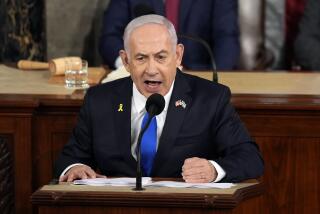Rowdy Lawmakers’ Anti-Gandhi Protest Throws India’s Parliament Into Chaos
- Share via
NEW DELHI — Chanting “Rajiv Gandhi is a thief,” scores of opposition legislators stood shoulder to shoulder Wednesday on the floor of Parliament and demanded that Prime Minister Gandhi resign after disclosure of improprieties in a $1-billion arms scandal that has become a key election-year issue.
The scene was described by parliamentary analysts as the most humiliating display directed at an Indian prime minister since independence from Britain 42 years ago. It left the bicameral Parliament virtually paralyzed on the second day of its so-called “monsoon session.”
The opposition contends that despite the absence of concrete evidence, Gandhi personally received millions of dollars in bribes in connection with the arms deal.
Restrained by Colleagues
Several members of Gandhi’s Congress-I Party, angered by the taunts, attempted to charge the opposition members but were restrained by colleagues.
For 15 minutes, throughout what the government described as pandemonium, Speaker Balram Jakhar screamed for order in the lower house of Parliament, known as the Lok Sabha. He finally gave up and adjourned the morning session, declaring, “I think the House does not need my services.”
The scene was repeated in the afternoon, when Jakhar tried without success to reconvene the Lok Sabha. Opposition leaders pledged to continue the disruptive activity today.
“I foresee a virtual paralysis of Parliament and of government for days, and maybe weeks, to come,” one member said, asking not to be identified by name.
Wednesday’s performance marked the beginning of the opposition’s all-out bid to end four decades of India’s dominance by the ruling party, during which Nehrus and Gandhis have headed the nation for all but three years.
Voting This Year
Gandhi, 44, a grandson of Jawaharlal Nehru, the first prime minister of independent India, succeeded his mother, Indira, after winning a landslide victory in elections soon after her assassination in 1984. He will have to face the voters again before the end of this year.
Throughout his term, Gandhi has been beset by allegations of corruption and incompetence, but on every occasion he has managed to defend himself.
His party has a commanding three-fourths majority in Parliament, where on Wednesday his supporters answered the opposition call for his resignation by proposing a vote of confidence, which Gandhi surely would win.
“We want discussion on this!” screamed Mamta Bannerji, a Gandhi stalwart.
“We want action,” replied the opposition leader, Arif Mohammed Khan. “We want resignation.”
When the opposition began chanting in Hindi that Gandhi is a thief, a few ruling-party members retorted that “V. P. Singh is a thief.” Vishwanath Pratap Singh, a former Gandhi ally who now heads a coalition of opposition parties, is largely responsible for exposing the scandal that touched off Wednesday’s uproar.
Former Defense Minister
Singh, seemingly the only one of the 545 members of Parliament who remained silent and seated during Wednesday’s shouting match, was Gandhi’s defense minister in March, 1986, when the controversial contract was signed with the Swedish arms manufacturer Bofors.
Under the terms of the contract, India agreed to purchase 410 artillery pieces--155-millimeter howitzers--together with ammunition and other hardware. The Gandhi government later confirmed that about $50 million of the total cost, which was just over $1 billion, went in commissions to three middlemen--non-Indian arms brokers whose names have not been made public.
After Singh resigned from the government, he appeared at a news conference and disclosed the numbers of Swiss bank accounts in which the commissions had been deposited. The deposits, Singh alleged, were payable to Rajiv Gandhi.
Gandhi conceded in an interview that Singh’s disclosures damaged him politically, but he denied that he took bribes in connection with the Bofors deal.
Gandhi has not replied to charges contained in a report by the Indian comptroller and auditor general, made public Tuesday, which provided the ammunition for Wednesday’s outburst by the opposition.
The report, based on an audit of Indian army records covering the Bofors purchase, stopped short of saying that bribes had been passed. It charged that there were “serious deficiencies” in the evaluation of the contract, that the government violated a standing order not to use agents or brokers in arms contracts and that there were improprieties.
The report said that on six occasions between 1982 and 1986, the Indian army command made it clear that it preferred a French artillery system but that the army suddenly reversed itself in February, 1986, a month before the contract was signed.
Report Delayed
A senior opposition leader conceded privately that the report, completed in March but withheld by the government for more than three months, “was not as bad as we had hoped for.”
But he added that the report’s findings will soon be lost in the political turmoil that the opposition plans to create. And this appeared to be borne out Wednesday as opposition leaders shouted insults and waved copies of the report, which several conceded they had not read in full.
“But it hardly matters,” one opposition leader said. “This year, it seems, we don’t even have to think up our own election issues. This prime minister keeps handing them to us on a plate.”
More to Read
Sign up for Essential California
The most important California stories and recommendations in your inbox every morning.
You may occasionally receive promotional content from the Los Angeles Times.













